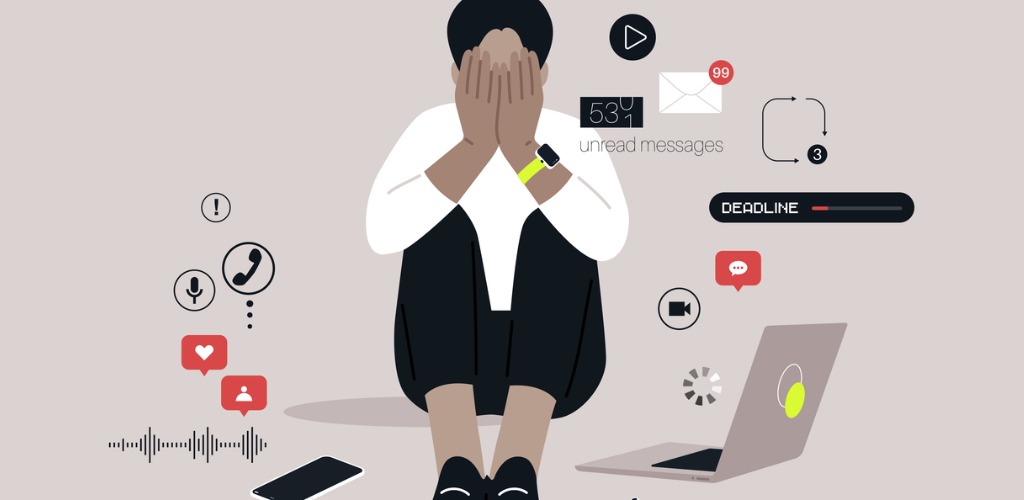
What Are Modern Stressors?
Modern stressors are the unique pressures and demands that come with life in the 21st century. They may not always be as obvious as traditional stress triggers, like major life events or sudden crises, but they can be persistent and cumulative.
They often stem from changes in lifestyle, technology, society, and the world around us, and they affect people of all ages.
Understanding and Coping in Today’s World
Life today comes with opportunities, conveniences, and connections that past generations could only dream of, but it also brings new kinds of pressures. These modern stressors are often constant, harder to escape, and sometimes hidden in plain sight. From technology overload to the pace of modern work, these stressors can take a toll on mental and physical health if they’re not managed well.
Understanding what they are, how they affect us, and what can be done to cope is an important step in protecting our mental well-being.
The Main Types of Modern Stressors
1. Technology and Social Media
Smartphones, constant notifications, and the pressure to stay connected can be exhausting. Social media can create unrealistic comparisons, fuel anxiety, and make it harder to switch off. There’s also the challenge of information overload — news, messages, and updates arriving 24/7.
Impact:
- Difficulty relaxing or “logging off” mentally.
- Lower self-esteem from comparison with others.
- Disrupted sleep patterns from excessive screen time.
Coping Strategies:
- Set boundaries for device use, especially before bed.
- Take regular “digital detox” breaks.
- Follow accounts that inspire and uplift, rather than trigger stress.
2. Work-Life Imbalance
Flexible working has blurred the line between home and work life. Many people feel they must be “always available” for emails, messages, or last-minute tasks. This can lead to burnout and make it harder to enjoy downtime.
Impact:
- Constant fatigue and lack of personal time.
- Strained relationships.
- Reduced job satisfaction and motivation.
Coping Strategies:
- Have a clear start and finish time for work.
- Use annual leave for proper rest, not just catching up on chores.
- Create a dedicated workspace if working from home.
3. Financial Stress
Rising living costs, housing prices, and debt are a growing concern. Worries about paying bills or saving for the future can feel overwhelming and constant.
Impact:
- Anxiety and sleep problems.
- Tension in relationships.
- Reduced ability to focus and make decisions.
Coping Strategies:
- Create a realistic budget and track spending.
- Seek free financial advice or support services.
- Focus on small, achievable financial goals to build confidence.
4. Societal Expectations
Modern culture often promotes an image of success that feels impossible to live up to. Social pressure to “have it all” — the career, the home, the perfect body, and an exciting social life — can leave people feeling inadequate.
Impact:
- Low self-worth and self-criticism.
- Pressure to overwork or overcommit.
- Burnout from trying to meet unrealistic standards.
Coping Strategies:
- Define success in your own terms.
- Limit exposure to unrealistic media portrayals.
- Celebrate personal progress rather than perfection.
5. Political and Environmental Concerns
Global issues such as climate change, political instability, and social injustice can create a background sense of unease or helplessness. Constant exposure to negative news can heighten these feelings.
Impact:
- Anxiety, frustration, or anger.
- Sense of powerlessness or despair.
- Withdrawal from conversations or community activities.
Coping Strategies:
- Focus on small, positive actions within your control.
- Limit time spent consuming news.
- Get involved in community or environmental projects.
6. Everyday Life Pressures
Traffic, household chores, childcare, and the small but constant demands of daily living can accumulate into significant stress. While none of these are major on their own, they can add up over time.
Impact:
- Irritability and short temper.
- Constant feeling of being “on the go.”
- Difficulty relaxing or enjoying leisure activities.
Coping Strategies:
- Break tasks into manageable steps.
- Share responsibilities where possible.
- Build small moments of rest into your day.
Why These Stressors Matter
The challenge with modern stressors is that they are often chronic rather than sudden. Because they’re woven into daily life, we may not notice how much they’re affecting us until we experience burnout, anxiety, or physical health issues.
Promoting Mental Well-Being in a Modern World
While we can’t remove every source of stress, we can take steps to protect our mental health:
- Prioritise rest — make downtime as important as work time.
- Stay connected — spend time with people who support and uplift you.
- Look after your body — regular exercise, balanced eating, and enough sleep make you more resilient.
- Practise mindfulness — simple breathing exercises or meditation can help you stay present.
- Know when to get help — talking to a GP, counsellor, or mental health professional is a sign of strength.
🌬️ Breathing and Relaxation Tools
-
Breathing Technique
-
Guided Fitness Videos
-
Mindful Breathing Timers
-
Restore Energy
-
Tension Release
























